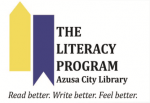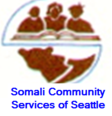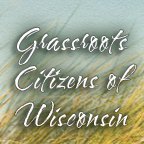General Literacy
These organizations focus on providing literacy resources for the community at large.
Burnett County Family Literacy offers tutoring for adults in children in math, reading, computer skills and family budgeting. Additionally, it disseminates public health information, conducts book giveaways and hosts weekly story hours. The program was founded by a library volunteer and “has worked closely with WI Literacy, Indianhead Community Action Agency (ICAA), North Memorial Ambulance, Larsen Family Public Library, UW Ext. and Northern Waters Learning in developing and maintaining programs.”

The Literacy Program at Azuza City Library offers small group tutoring to English learners as well as “Leamos, a free computer-based program for adults who speak Spanish but cannot read and write in Spanish.” The program draws upon community members as tutors and has partnered with a variety of local organizations such as Azusa City Library, Lee Elementary School, Dalton Elementary School, Neighborhood Homework House, Azusa Hispanic Foursquare Church, Canyon Christian Fellowship and Foothill Family Service in order to provide its services.
Population-Specific
These organizations focus on providing literacy resources for a specific population within the community.
![]()
The Refugee Women’s Alliance (ReWA) seeks to provide “refugee and immigrant women and their families with culturally and linguistically appropriate services.” Its programs are numerous and varied, but include ESL classes meant to help clients integrate and secure employment. As stated above, despite being “one of the largest non-profit refugee and immigrant service providers” in the local area, ReWA, founded in 1985 by a group of successfully settled women refugees, continues to hire a staff composted primarily of refugees and immigrants.
 Somali Community Services of Seattle, founded by a group of Somali refugees in the 1990s, aims to “work for the success of refugees in assuring a smooth transitional process, and attaining a self-sustainable status in their new country.” Though initially focused on Somali refugees, it now serves immigrants and refugees of all nationalities. Among other services, this organization provides ESL classes and welcomes parents to participate in after-school tutoring programs alongside their children.
Somali Community Services of Seattle, founded by a group of Somali refugees in the 1990s, aims to “work for the success of refugees in assuring a smooth transitional process, and attaining a self-sustainable status in their new country.” Though initially focused on Somali refugees, it now serves immigrants and refugees of all nationalities. Among other services, this organization provides ESL classes and welcomes parents to participate in after-school tutoring programs alongside their children.

Cidadāo Global fights to “raise the political visibility of Brazilian immigrants to ensure that the community has the tools and resources to collectively advocate for their human rights through systemic change.” Specifically, it works through grassroots organizing, leadership development, advocacy and by providing essential services such as ESL classes to Brazilian immigrants.
Full-Service, Networks and Mergers
These organizations focus on providing more comprehensive services to address a wider range of needs within the community.

Literacy Connects formed as a merger of 5 existing literacy organizations, after 165 community members at a Tucson Regional Town Hall meeting “identified increasing literacy levels as the single best way to ensure a prosperous economy and an improved quality of life for everyone in Tucson.” Among other programs, it offers basic literacy and English language acquisition classes for adults, seeking to “support those who have fallen behind or fallen out of the [educational] pipeline and need additional resources to continue their learning.”
Central City Neighborhood Partners provides a “‘one-stop service center’ for low-income families,” conducts community-led research to support community development and engages in advocacy work for low-income communities. For adults, it offers parenting and ESL classes. Critical and unique to the organization are its promotoras—“women leaders who live in the community and have been trained to educate, guide and refer community residents to resources affecting their health and social service needs”—and its board of directors which is composed entirely of community members. The organization formed in the early 1990s when community leaders in Los Angeles became concerned about the effects that riots were having on their communities and wanted to “collaborate, rebuild and share resources” so as to “develop innovative solutions that would address the community’s most pressing concerns -poverty, crime, unemployment, drugs, gangs and violence.”
Flint and Genesee Literacy Network is a coalition of community stakeholder organizations that have come together “to align and improve literacy resources and services in Flint and Genesee County” in response to a work-group that identified a basic skills crisis in the local area. The Network maintains an accountability scorecard to measure its efficacy, offers volunteer opportunities and provides a database of literacy services, including family literacy programs and tutoring.
 Grassroots Citizens of Wisconsin is “a network of engaged people in southwest Wisconsin who through constructive dialogue and education foster informed, positive change in [their] communities.” The group has a variety of interest groups which are dictated by the interests of the community members. One interest group is the Immigration Group, which is establishing the Multicultural Outreach Program: a “resource, referral and assistance program for new immigrants and their families” in southwest Wisconsin. It provides ESL tutoring as well as bilingual workshops and service directories.
Grassroots Citizens of Wisconsin is “a network of engaged people in southwest Wisconsin who through constructive dialogue and education foster informed, positive change in [their] communities.” The group has a variety of interest groups which are dictated by the interests of the community members. One interest group is the Immigration Group, which is establishing the Multicultural Outreach Program: a “resource, referral and assistance program for new immigrants and their families” in southwest Wisconsin. It provides ESL tutoring as well as bilingual workshops and service directories.
Roots Still Growing
This organization is in the early stages of grassroots organizing.
Dog Ears Bookstore , a non-profit shop, café and arts center in Buffalo, NY, offers an example of ongoing grassroots organizing. According to recent article in Buffalo Rising, Dog Ears recently held a public meeting “to ask educators about the types of programs and initiatives that they would like to see introduced, with intentions to strengthen and promote literacy in Buffalo. ” Though no further details on the developing literacy program have been published, an April 22 fundraiser suggests that planning is underway.
, a non-profit shop, café and arts center in Buffalo, NY, offers an example of ongoing grassroots organizing. According to recent article in Buffalo Rising, Dog Ears recently held a public meeting “to ask educators about the types of programs and initiatives that they would like to see introduced, with intentions to strengthen and promote literacy in Buffalo. ” Though no further details on the developing literacy program have been published, an April 22 fundraiser suggests that planning is underway.
All quotes and images on this page are the property of their respective organizations.



